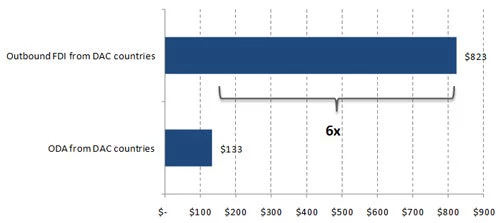Over the past decade foreign direct investment (FDI) has become a major force in developing and transition economies. In 2010 the volume of FDI to developing and transition economies for the first time exceeded the FDI to rich economies. In a speech on Democratizing Development Economics delivered at Georgetown University last September, World Bank President Robert Zoellick pointed out that “In the 2000s, Foreign Direct Investment (FDI) inflows were the single biggest source of capital for developing countries and a critical input for technology transfer in developing country firms.”
Figure 1: Comparison of Outbound FDI vs. Official Development Assistance (ODA) from Development Assistance Committee (DAC) countries in 2009 (US$ billions)
Source: OECD, UNCTAD
Figure 1 (above) shows clearly that FDI is a global force—in 2009 outbound FDI flows from the 24 Development Assistance Committee (DAC) countries were six times larger than official development assistance (ODA)—but is FDI a force for good? To answer this question we need to turn to the broader question of whether FDI has development impact, i.e. does foreign private capital provide sustainable benefits to its recipients.
The standard model holds that FDI creates direct benefits such as new capital and jobs, which in turn boost government tax revenues and foreign exchange. However, the real economic development impact of FDI comes from the indirect benefits (or spillovers) FDI creates such as the transfer of new technology, labor skills, management and organizational practices as well as fostering competition and innovation.
Yet if we break FDI down by sector and destination evidence to support the model becomes much more cloudy. Certainly FDI can create transformational economic benefits for host economies, but not in all circumstances. For example the track record of extractive-industry FDI has not always shown clear benefits, particularly in its inability to generate linkages and spillovers to local economies. Worse, in some cases extractive-industry FDI has actually exacerbated inequality, as is the case currently in Angola as well as the Niger Delta, where it has created severe social and environmental challenges to the receiving economy.
In addition, when economies compete for FDI by offering fiscal or tax incentives to potential investors, the case for clear welfare gains for the host economy is also less clear. There are many cases such as in Brazil where countries in the same region or states within the same country compete to attract FDI projects without coordinating their actions, allowing foreign companies to play the states against each other and gain huge—and in my view often unjustified—breaks, such as free land in perpetuity. Our work clearly shows that incentives only work in specific circumstances.
But despite these anecdotes, there is clear evidence that FDI in a broad majority of cases is indeed beneficial to the recipient economy. According to data from fDi Markets FDI is responsible for an average of approximately 2 million new jobs a year in developing and transition economies. The case is particularly strong when the FDI is supported by strong, transparent government institutions, focused in sectors that have high potential to link with the local economy, and takes advantage of a local labor force able to absorb knowledge and skills that can help spur a dynamic local industry.
Consider some of the numerous examples: Fiesta Hotel Group (Spain) which invested $230 million in city of Salvador (Bahia), Brazil to construct a new hotel creating 1441 new jobs in 2010. Hyundai Motor’s (Korea) built a bus and truck assembly plant in Talgar, Kazahkstan (the company’s first in Cental Asia) 1197 new jobs. Coca-Cola (USA) invested $200 million in town of Tepotzotlan, Mexico to build a Jugos del Valle juice manufacturing plant generating 1500 jobs. Mahindra & Mahindra (India) which built a tractor assembly plant in Kumasi, Ghana creating 1047 jobs.
In sum I would argue FDI is not only a powerful force in developing countries, but a force for good. Yet we should not take for granted the benefits of FDI as a given. Positive development impact is not an automatic consequence of FDI in all cases. Our challenge in the decades to come will be to ensure that developing economies take advantage of its potential upside while also working to limit the potential risks FDI brings.
What do readers think? Is FDI a force for good or bad in developing economies? And do you have any particular cases you could share to support your point of view? I look forward to a lively debate.


Join the Conversation